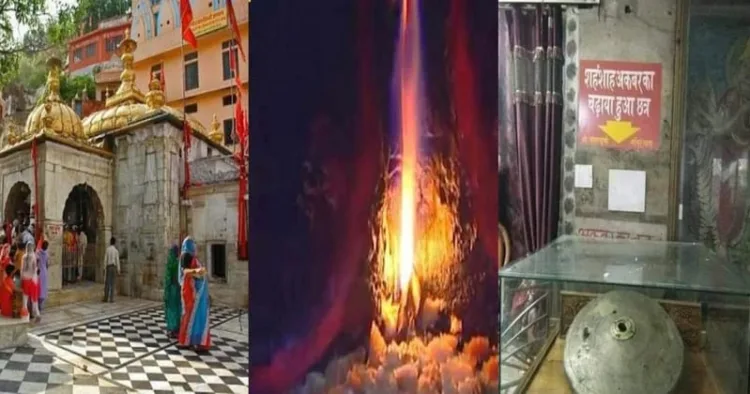The Jwalamukhi Mandir is one of India’s 51 Shakti Peethas and is well-known for not having any murtis. The Mandir is located in the Himachal Pradesh town of Jwalamukhi, 35 km south of the Kangra Valley. It is dedicated to Jwalamukhi, the Goddess of Light, also known as the Flaming Goddess or She of the Flaming Mouth.
The temple is set amidst undulating hills overlooking the Dhauladhar range. According to Hindu mythology, when Bhagwan Vishnu cut through Sati’s corpse, her tongue fell off at this site. Even the Pandavas are regarded as having visited this sacred place.
Raja Bhumi Chand Katoch of Kangra, a devoted follower of Maa Durga, is said to have dreamed of the holy site and set people to trace its whereabouts. After discovering the site, the Raja erected the temple at that very location. The temple was built in a modern design. Its dome is made from gold and the temple possesses a beautiful folding door made out of silver plates.
The story of Mughal Emperor Akbar visiting the Jwala Mandir to verify its uniqueness, attempting to douse its flames with water but failing due to the Goddess’s power, is well-known. However, contrasting narratives about Akbar’s actions exist. According to Professor Bhardwaj, a retired historian who has extensively studied this period, it is true that Akbar visited the Jwala Mandir during campaigns against Nurpur and Chamba. Despite attempting to extinguish the temple’s sacred flames with a canal of water, he was unable to succeed. Subsequently, Akbar ordered the temple’s demolition and covered the site with large rocks, leading to the execution of its servants and priests.
Later, King Sansar Chand of Chamba reconstructed the Mandir, and during the Sikh Empire, Maharaja Ranjit Singh honoured it by installing a golden umbrella. His son, Sher Singh, further embellished the Mandir with silver gates at the main entrance.
When questioned about the historical accounts inscribed at the temple, Professor Bhardwaj criticised them as false and reflective of political agendas aimed at fostering Hindu-Muslim unity and glorifying Akbar. He lamented the influence of biased historians who distort facts to fit their narratives, perpetuating falsehoods that eventually become accepted as truth through repetition among Hindus.



















Comments